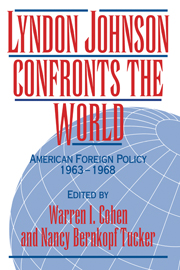Book contents
- Frontmatter
- Contents
- Dedication
- Acknowledgments
- List of Contributors
- Introduction
- 1 Lyndon B. Johnson: Change and Continuity
- 2 Johnson, Vietnam, and Tocqueville
- 3 “A Time in the Tide of Men's Affairs”: Lyndon Johnson and Vietnam
- 4 Threats, Opportunities, and Frustrations in East Asia
- 5 Toward Disillusionment and Disengagement in South Asia
- 6 Lyndon B. Johnson, Germany, and “the End of the Cold War”
- 7 The Promise of Progress: U.S. Relations with Latin America During the Administration of Lyndon B. Johnson
- 8 Keeping Africa off the Agenda
- 9 Balancing American Interests in the Middle East: Lyndon Baines Johnson vs. Gamal Abdul Nasser
- 10 Lyndon Johnson: A Final Reckoning
- Suggestions for Further Reading
- Index
3 - “A Time in the Tide of Men's Affairs”: Lyndon Johnson and Vietnam
Published online by Cambridge University Press: 05 June 2012
- Frontmatter
- Contents
- Dedication
- Acknowledgments
- List of Contributors
- Introduction
- 1 Lyndon B. Johnson: Change and Continuity
- 2 Johnson, Vietnam, and Tocqueville
- 3 “A Time in the Tide of Men's Affairs”: Lyndon Johnson and Vietnam
- 4 Threats, Opportunities, and Frustrations in East Asia
- 5 Toward Disillusionment and Disengagement in South Asia
- 6 Lyndon B. Johnson, Germany, and “the End of the Cold War”
- 7 The Promise of Progress: U.S. Relations with Latin America During the Administration of Lyndon B. Johnson
- 8 Keeping Africa off the Agenda
- 9 Balancing American Interests in the Middle East: Lyndon Baines Johnson vs. Gamal Abdul Nasser
- 10 Lyndon Johnson: A Final Reckoning
- Suggestions for Further Reading
- Index
Summary
Lyndon B. Johnson transformed the security blanket for South Vietnam he inherited from his predecessors into an armored shield. By 1967 some half-million U.S. troops were engaged in combat, American deaths were approaching 15,000, the Air Force was dropping more bombs than in all the World War II theaters, and the price of the effort exceeded $2 billion per month. Unable nevertheless to achieve a military victory or coerce Hanoi to negotiate on America's terms, Johnson the next year abandoned his quest for reelection. Running in his stead, Hubert H. Humphrey lost to Richard M. Nixon. Johnson' war polarized Americans to an extent unparalleled since the Civil War, shattered the Cold War consensus on foreign policy, crippled the Great Society, and eroded the public's faith and confidence in its government.
Johnson's responsibility for both the Americanization of the war and the peace talks that eventually brought U.S. involvement to a close has skewed the historiography. A disproportionate percentage of the immense scholarship on America in Vietnam focuses on the years from 1964, when the president engineered the Gulf of Tonkin Resolution, which provided the legal mechanism for direct military intervention, to 1968, Johnson's final full year in office.
This literature especially highlights the escalation of America's intervention from the February 1965 launching of Rolling Thunder, the sustained (in contrast to retaliatory) bombing campaign of North Vietnam, to July of that year, when Johnson announced what was tantamount to an open-ended commitment to employ American military force to preserve an independent, noncommunist South Vietnam.
- Type
- Chapter
- Information
- Lyndon Johnson Confronts the WorldAmerican Foreign Policy 1963–1968, pp. 57 - 98Publisher: Cambridge University PressPrint publication year: 1995



